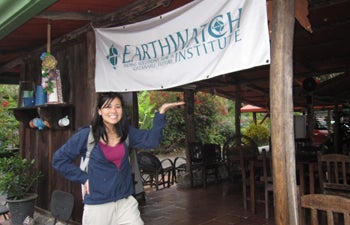Wake Up and Smell the Coffee
Volunteering at organic coffee farms in Costa Rica, Pam Mizuno rose with the sun each morning around 5 a.m.
Once on her feet, Mizuno would slather on a thick layer of sunblock, coat herself in bug spray, then enjoy a hearty breakfast of fresh juice and rice and beans drizzled liberally with Salsa Lizano, a Costa Rican condiment that tastes great on everything. A mug of big-bodied, smooth Costa Rican coffee completed each meal.
That delicious coffee that supports the livelihood of so many farmers is being threatened by a fungal disease called American leaf spot or ojo de gallo, one of the most harmful ailments affecting coffee plants in Latin America. Mizuno, who completed her progressive master’s degree in international relations at USC Dornsife in 2010, was in Costa Rica with a group of volunteers in part to assist a Ph.D. student from the University of Costa Rica who was studying the disease at several coffee farms. They collected leaf and soil samples, estimated coffee yields and assessed plant health.
The 2010-11 coffee harvest fell about 12 percent from the previous year due to this disease. Most farmers use fungicides to control it, but the practice is not sustainable or environmentally friendly since the fungus can build up a resistance to the fungicides. The graduate student’s research focused on finding sustainable ways to reduce the severity and prevalence of the disease without impacting the quality of the coffee.
Mizuno has spent the last three years working for EY, a professional services organization that is a global leader in assurance, tax, transactions and advisory services. Working in its Los Angeles office, Mizuno is a paralegal to the firm’s general counsel.
“When I first started at EY, I learned about the ambassadors program,” Mizuno said. “I thought, ‘Wow, this is the perfect program for me, a combination of how much I love the environment and how much I love helping people.’ From that day on I knew I wanted to participate.”
Now in its fifth year in Costa Rica, the EY-Earthwatch Ambassadors program sent Mizuno and her fellow volunteers to Santa María de Dota and San Marcos de Tarrazú in the country’s Tarrazú/Los Santos coffee region. There, the 10 ambassadors worked with a 2,600-member coffee farming cooperative, conducting field research and collecting data to help understand the practices that lead to optimum and sustainable coffee production.
“One of my concentrations within international relations was international political economy,” she said. “This gave me a framework to understand and appreciate how the co-op strategically implemented practices related to supply and demand and fair trade. It was a real life case study for me.”

Mizuno got real life exposure to topics studied in her international relations coursework at USC Dornsife, including the implementation of sustainability practices and fair trade. Photo courtesy of Pam Mizuno.
Real life meant real work. She spent long mornings of field research and data collection in the tropical heat. At 10 a.m. came “Fruit Time,” when volunteers were refreshed with juicy tropical fruits like mango, pineapple and papaya before finishing off a few more hours of work.
After lunch, she and fellow volunteers met with members of the cooperative farm and co-op leaders, and toured coffee farms.
Mizuno was impressed with the coffee farms’ many sustainability practices. These ranged from converting animal waste into fuel to reusing the water they used to wash the coffee cherries to irrigate the fields. Additionally, after separating out the coffee beans from the cherries and husks, rather than throwing out the husks, they were dried for use as fertilizer or burning fuel when roasting the beans.
“Because of these practices, these coffee farms end up with completely carbon neutral coffee products,” she said. “This was great to see in practice, especially having studied the topics of environmental impact and fair trade and carbon neutrality at USC.”
She said her international relations lessons came to life when she saw how the coffee industry has transformed these farmers’ lives.
“It all really clicked for me,” she said.
At USC, Mizuno was involved with the Joint Educational Project (JEP), Teaching International Relations Program (TIRP) and other community service that allowed her to interact with people from throughout the world. These experiences translated seamlessly into her professional environment at EY, where she says everyone is committed to working with and giving back to the community.
“With my international relations background I thought I’d be working for the UN or something similar,” she said. “But it’s wonderful to be able to contribute and do what an IR person would do, but in a non-IR setting.”
Aside from understanding the industry and its international economy, something else clicked for Mizuno.
“I wasn’t a big coffee drinker before this expedition, but between working on the coffee farms, seeing how positively the industry has affected peoples’ lives and consuming the best coffee in the world for a week straight, I truly learned to appreciate and enjoy coffee. So much so that I brought back an entire suitcase of it!”